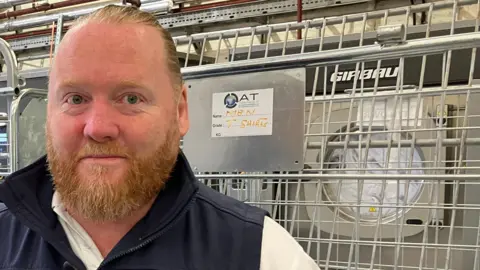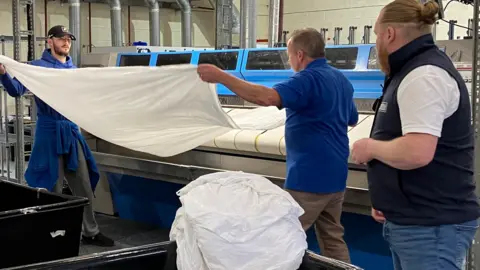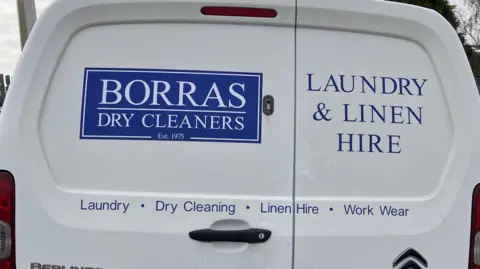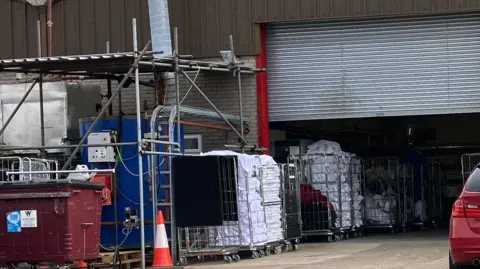 BBC
BBCA dry cleaner has stated that only 10 miles away can charge a quarter price fee for services due to separate energy prices between business areas.
Small and medium-sized businesses in North Wales and Mercesis are expected to pay 13% more in electricity bills than London from this month, known as third-party fee due to non-viresle energy costs.
Mike Jones, who runs Borras Dry Cleaners at Wrexham, said that his company was being “punished” by paying 8% more than the UK average.
Energy Bill Forecaster Cornwall Insight stated that forecasts highlighted the “Stark Regional inequalities” faced by small businesses.

Mr. Jones said that the cost of his running was already higher and the increase in energy bills would already affect the lower profit margin.
He said: “East-Kovid we spent about £ 1,000 to £ 2,000 per month and now we are probably paying £ 8,000 to £ 10,000.”
He said that the North Wales and Mercesis were barely hitting the North Wales and Mercesis to deal with the highest allegations in Britain.
According to research by Cornwall Insight, small businesses are expected to pay an average of £ 19,000 more per year as an average enterprise and London.
He said: “The problem is when there is an English company at a distance of 10 miles from the road, giving a fraction of the price that we are.
“Customers can find a company across the border that can serve them at a quarter of the price we can.
“We are a local business, giving employment to the local people and we are punishing – for what reason? Nobody knows.”
What are the third-party fees?
The third-party fee varies from the area to the region and about 60% form a commercial electricity bill.
These include all electricity costs outside the fuel price and are divided into network fees such as distribution and transmission costs, and policy costs such as funds for government initiatives such as renewable energy.

Cornwall Insight researched how companies would be affected by the difference in allegations in the UK.
About 81% of the UK businesses expect to increase prices due to high energy bills from Tuesday, it was found.
Cornwall Insight Chief Advisor Dr. Craig Lovre said: “These forecasts highlight the Stark regional inequalities in the cost of electricity for SMEs (small and medium -sized enterprises).
“Third-party allegations faced by those faced by people in special areas only serve to highlight the problems faced by businesses that can already work on a razor-thread margin.”
Mr. Jones said: “You will see a contestant and think ‘Who is going before?” If the company goes first, you will go to their work.
“Then you just take more energy costs. We can’t put our prices because it is impossible. People will stop using us.”

This increase comes at the top of recent growth in national insurance and other utility bills of employers, which means the public is facing even more prices because the firms pass on additional costs.
Dr. Lovre said: “It is time to consider efficiency measures for businesses to review your energy strategies, detect switching opportunities and to reduce rising costs.”

Two women who are also concerned about the increase in energy bills are Jemma Rownds and Lauren Burden, Wrexham.
The pair runs a help group for parents and “surprised” the increase in gas, electric and council tax.
Single mother Ms. Rowlands said that the situation was “not good” and without the increasing bills it was “trying enough to support a child”.
“It is shopping and food is difficult,” he said.
“You are thinking that ‘oh this is really cold’ but I can’t risk putting heating and we are using blankets instead.”
Similarly, her friend Ms. Burdon said that “Council Tax has been shot,” who disappoints him as “nonsense and pits everywhere”.
“I know that a lot of beautification is going on which is cute, but still there is much that needs to be done.”
Ms. Burdon also said that she was angry about the increase in water bills because “a lot of water waste”.
“Then you listen to those who are running it [water companies] Giving £ 6m bonuses ourselves and we are struggling to put a kettle on it to fill it because we cannot buy water to make a cup of tea.
“They are taking and taking us.”












